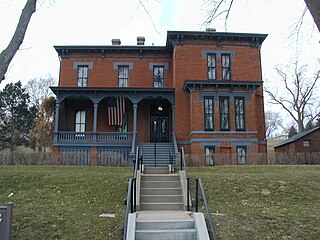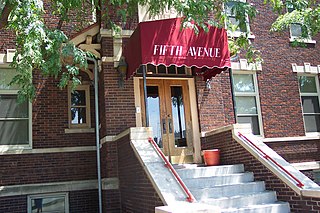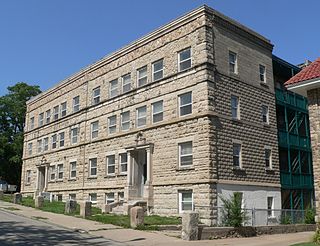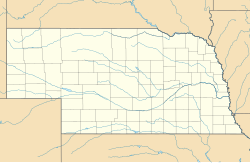
The Old Market is a neighborhood located in downtown Omaha, Nebraska, United States, and is bordered by South 10th Street to the east, 13th Street to the west, Farnam Street to the north and Jackson Street to the South. The neighborhood has many restaurants, art galleries and upscale shopping. The area retains its brick paved streets from the turn of the 20th century, horse-drawn carriages, and covered sidewalks in some areas. It is not uncommon to see a variety of street performers, artists, and other vendors.

The General George Crook House Museum is located in Fort Omaha. The Fort is located in the Miller Park neighborhood of North Omaha, Nebraska, United States. The house was listed on the National Register of Historic Places in 1969, and is a contributing property to the Fort Omaha Historic District.

Holy Family Church was built in 1883 at 1715 Izard Street, at the intersections of 18th and Izard Streets in North Omaha, Nebraska within the Roman Catholic Archdiocese of Omaha. It is the oldest existing Catholic Church in Omaha, and is listed on the National Register of Historic Places.

The Drake Court Apartments and the Dartmore Apartments Historic District, built between 1916 and 1921, is located at Jones Street from 20th to 23rd Streets in Midtown Omaha, in the U.S. state of Nebraska. Built in combined Georgian Revival, Colonial Revival and Prairie School styles, the complex was designated a City of Omaha Landmark in 1978; it was listed on the National Register of Historic Places as a historic district in 1980. The historic district originally included 6.5 acres (2.6 ha) with 19 buildings. In 2014, boundary of the historic district was expanded by 0.74 acres (0.30 ha) include three additional buildings, and decreased by 3 acres (1.2 ha) to remove open space and parking that had been re-purposed, for a new total of 4.24 acres (1.72 ha). The district was also renamed to Drake Court Historic District.

The South Omaha Main Street Historic District is located along South 24th Street between M and O Streets in South Omaha, Nebraska. It was added to the National Register of Historic Places in 1989. Home to dozens of historically important buildings, including the Packer's National Bank Building, the historic district includes 129 acres (0.52 km2) and more than 32 buildings.

The Omaha Rail and Commerce Historic District, roughly bounded by Jackson, 15th, and 8th Streets, as well as the Union Pacific main line, is located in downtown Omaha, Nebraska. Today this historic district includes several buildings listed individually on the National Register of Historic Places, including the Union Pacific Depot and the Burlington Station.

The Christian Specht Building is located at 1110 Douglas Street in downtown Omaha, Nebraska. It is the only existing building with a cast-iron facade known in Nebraska today, and one of the few ever built in the state. The building was deemed an Omaha landmark in 1981, and was listed on the National Register of Historic Places in 1977.

The Melrose Apartments were built in 1916 at 602 North 33rd Street in the Gifford Park neighborhood of Omaha, Nebraska. The Melrose was listed on the National Register of Historic Places in 1989.

Vinton School was built as a fourteen-room elementary school in 1908 at 2120 Deer Park Boulevard in the Deer Park neighborhood of Omaha, Nebraska, United States. Designed by Omaha architect Frederick W. Clarke, Vinton School is the earliest and most elaborate example of a Tudor Revival-style school in Omaha. Designated an Omaha Landmark in June 1990, the building was listed on the National Register of Historic Places in November 1989.

Mason School is located at 1012 South 24th Street in south Omaha, Nebraska, United States. Designed in the Richardson Romanesque style by the architectural firm of Mendelssohn, Fisher and Lawrie, the school was built in 1888 by the brick manufacturing and construction firm of Hadden, Rocheford & Gould. The school closed in the late 1970s and was converted into apartments. It was designated an Omaha Landmark in 1986 and listed on the National Register of Historic Places that same year.

The Eggerss–O'Flyng Building is located at 801 South 15th Street in downtown Omaha, Nebraska, United States. The building was listed on the National Register of Historic Places in 1991, and named an Omaha Landmark on March 17, 1992.

The Rose Blumkin Performing Arts Center or The Rose, also known as the Astro Theater, originally opened as The Riviera. It is located in downtown Omaha, Nebraska. Built in 1926 in a combination of both Moorish and Classical styles, the building was rehabilitated in 1986.

The Ford Hospital, also called the Fifth Avenue Hotel, is located in downtown Omaha, Nebraska. Built in 1916 by Home Builders Incorporated, the hospital was a privately operated facility built and operated by Dr. Michael J. Ford. Operating until 1922, it was the last small, private hospital in the city. Originally designed by James T. Allan, the building stylistically is a unique blend of elements from the Second Renaissance Revival and the Arts and Crafts movements. The building was sold and remodeled as the Fifth Avenue Hotel in 1929, a name referring to the nickname Douglas Street obtained after the installation of new electric lights in 1927. The building was again converted in 1987, and currently serves as apartments.

The original Columbian Elementary School is a former public elementary school located at 3819 Jones Street in Omaha, Nebraska. It was listed on the National Register of Historic Places as Columbian School in 1990. It was declared an Omaha Landmark in 1990.

The Bradford–Pettis House is a historic house located at 400 South 39th Street in Midtown Omaha, Nebraska. It was designated an Omaha Landmark on February 26, 1980, and added to the National Register of Historic Places on July 21, 1983.

The Robbins School, originally called Franklin School, is located at 4302 South 39th Avenue in South Omaha, Nebraska, United States. It was built in 1910 to serve a newly established and growing Polish community in south Omaha. A 2000 rehabilitation converted the former school to rental residential use.

The Leone, Florentine, and Carpathia Apartment Buildings are located at 832 and 834 South 24 Street and 907-911 South 25 Street in Omaha, Nebraska, USA. Built in 1909, the buildings were listed on the National Register of Historic Places in 1985.

The Saint Joseph Parish Complex is located at 1730 South 16th Street in South Omaha, Nebraska within the Roman Catholic Archdiocese of Omaha.
John Latenser Sr. (1858–1936) was an American architect whose influential public works in Omaha, Nebraska, numbered in the dozens. His original name was Johann Laternser.




















